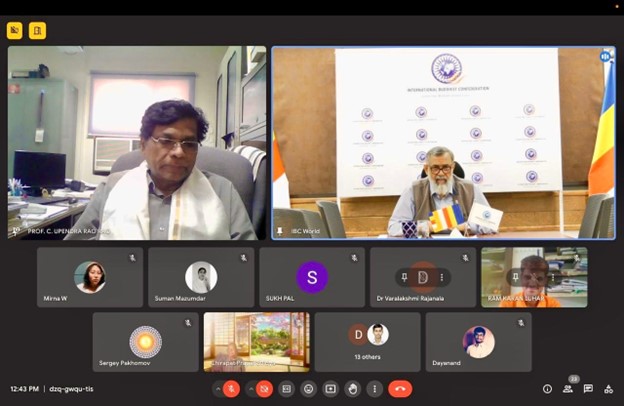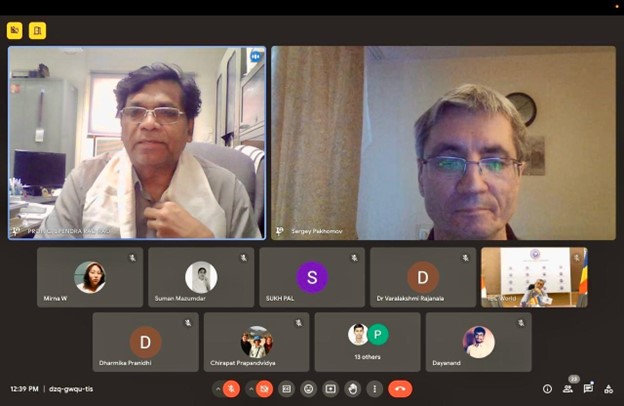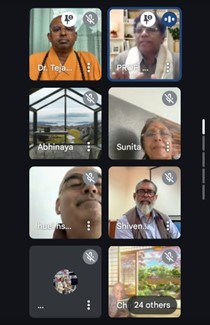-

International Virtual Symposium on the Universal Message of Bhagavān Buddha

The School of Sanskrit and Indic Studies at Jawaharlal Nehru University, New Delhi, organized “International Virtual Symposium on the Universal Message of Bhagavān Buddha," on 27th of May 2024; to commemorate the occasion of Buddha Jayanti.

With the help of the digital platform; eminent figures from the Buddhist community graced the event. Notably, Shri Abhijit Halder, the Director General of the International Buddhist Confederation (IBC), attended the symposium as the Chief Guest. He mentioned that the teachings of the Buddha are timeless (Akaliko), and are relevant even after two thousand five hundred years of His Mahāparinirvāṇa. He highlighted that although the Buddha Dhamma is relevant; yet the message and the teachings are not being followed to a great degree. The incurring losses of lives in conflict zones or natural disasters or even the recent pandemic; showcases a stance that there is prerequisite for compassion; harmony and peace along with the teachings of the Buddha which is to be pursued and followed diligently. To begin with, we can focus on the basic principles of Sila(morality), Samadhi(meditation) and Prajňa(wisdom), avoiding extremities; viewing things with practicality, trusting ourselves and the essence of Vipassanā in our daily life.

Padma Shri Dr. Chirapat Prapandavidya from Shilpakorn University, Bangkok, Thailand, and Prof. Dharmika Pranidhi, Vice Rector of Nalanda Buddhist College, Jakarta, Indonesia, joined the occasion as Guests of Honour. Prof. Dharmika stressed on the importance of the Buddhist inscriptions, Buddhist education and the effect of transmission of Buddhism in Indonesia. With a fascinating presentation, she discussed the belief system, the fine arts and language. She said that The Buddha’s message of universal acceptance is reflected in Bhinneka Tunggal Ika, the official national motto of Indonesia. The motto describes the unity and integrity of various cultures, ethnicities, languages and beliefs. She spoke on the five aggregates of clinging (Pañcupādānakkhandhā) leading to suffering, they are: Rupa, Vedana, Samjna, Samskara, Vijnana; while the removal of Ignorance (Avijja), the practice of (Pāramitās) and the Noble Eight-Fold Path can lead to true happiness; and ultimate the Enlightenment (Nirvāṇa).

The symposium featured a prominent lineup of speakers, each bringing their unique perspective and expertise to the discussion. Ven. Lama Chosphel Zotpa, Deputy Secretary General of IBC, India; Prof. Dr. Suvin Ruksat, President of the Buddhist Studies Department at Mahamukut Buddhist University, Thailand and Ven. Dr. Hui Xuan, Zen Master from the United States of America contributed significantly through their articulate delivery. Among them were Ven. Dhammadeep Bhante, President of the Korea-India Friendship Association and Dr. Sergey Pakhomov, Associate Professor at the Institute of Philosophy, Russia.
Dr. Sergey spoke on Buddhism in Russia and its development during and after the fall of the USSR; which often projected Buddhism in a socialistic light. He highlighted the plight of persecution faced by the clergy, while after the dissolution, not only exchanges between Russian Buddhist and other Buddhist communities have increased globally but also the religious sites, which were affected amidst the disputes are in the process of restoration. Ven. Dr. Tejawaro Thero, President of the Karuna Yoga Vihara Association, Malaysia; spoke on the importance of the Four Immeasurables or the Brahmavihārā, and how the teachings of the Buddha acts as a medicine for the suffering. Venerable stressed on the food culture and how we can control desire through the application of Karuna on a daily basis.
The presentations complemented the theme and contributed to the holistic understanding of the students. A concluding note of gratitude was delivered by Dr. Mauhar Singh Meena, also from the School of Sanskrit and Indic Studies, JNU. This virtual symposium thus became an opportunity for scholars, practitioners, and enthusiasts alike to come together in celebration and exploration of the Buddha Dharma.
